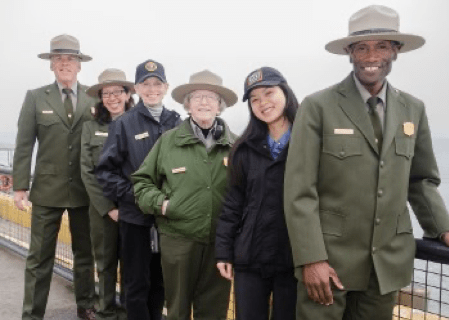Three Informational Interview Takeaways
Written by: Jade Ryerson

Over the course of my internship I’ve had the opportunity to do informational interviews with National Park Service (NPS) staff whose careers have been of interest to me. During this pay period, I spoke with a Cultural Resources Specialist with a background in archaeology and a Park Guide who does predominantly interpretative work at a nature-based park. While those backgrounds differ from my own, it’s always valuable to hear about people’s paths into NPS—especially because of how varied those paths can be.

At the time of the interviews, I didn’t know that I would be writing and reflecting about those conversations on a public platform. For that reason, I’ve generalized some of the information I received and omitted specific names and places to maintain the privacy of the individuals who spoke with me.
Here are a few broad takeaways:
1. Job titles can be fluid.
Because of the nature of federal hiring, many job titles are reused although the descriptions and duties associated with them may vary. Depending on the park or site, one Cultural Resources Specialist might conduct condition assessments and Section 106 compliance, while another might be doing work that is more creative or research-based. In terms of career mobility, even a lateral move to another park or site might involve totally different duties under the same job title.
On the other hand, many positions can be very siloed. For instance, the duties for a Park Guide who works in interpretation are primarily public-facing. This can leave Park Guides’ and Rangers’ abilities in areas outside of the job description (such as historical research) untapped. Some of these duties are also up to the discretion of the supervisor. For that reason, the interview stage offers an opportunity for new hires with a special skill set to discuss how their abilities can benefit the site. Asking a potential supervisor if there’s any time to carve out for that unique skill set can ensure a valuable asset isn’t squandered.
2. Experience, experience, experience.
Many aspiring NPS employees have discovered the agency’s love of relevant, practical experience—and for good reason. NPS really values practical experience in the field, which aspiring federal hires can gain through internship programs with partner organizations like the American Conservation Experience (ACE). ACE members undertake a vast array of projects at NPS sites across the country. By completing these internships, ACE members can also work hours towards achieving eligibility in special hiring authorities such as the Public Land Corps.
Students should note that on USAJobs, education level can also be equated with years of specialized experience. While an education provides a strong background in research, it can sometimes reduce the amount of time that an aspiring hire can dedicate to hands-on practice. For some positions, a diversity of skills can be valuable. While it is critical to know one’s area of expertise confidently, familiarity with other subjects can be helpful. The ability to speak to those experiences in specific detail is also essential, especially when creating federal resumes and filling out the USAJobs questionnaire.

3. Career mobility can involve physical mobility.
There’s a saying that you have to be willing to move out to move up at NPS. It is not uncommon for employees to work in seasonal positions to gain additional specialized experience before qualifying for permanent positions. Because seasonal positions are inherently short-term, moving from job to job may require employees to bounce around between parks and sites.
For some, the prospect of living and working all over the country is exciting. For others, it can be a prohibitive economic barrier. Furthermore, some parks are more insulated and isolated than others and the surrounding areas may lack demographic diversity. Despite the relative instability of these positions, the fulfilling, mission-driven nature of the work cannot be undervalued. Parks themselves are often the source of strong communities.
As I’ve already mentioned, everyone’s path into NPS is different, so these takeaways are by no means the be-all and end-all. Many others have already written extensively about federal hiring at NPS, so I know a lot of the things I’ve found insightful and thought-provoking aren’t groundbreaking or universal. Because all of my experience with NPS has been in the digital workplace, I feel really fortunate and grateful that current staff have been willing to connect and share their experiences with me. I just hope that I can secure a position and return the favor someday.
